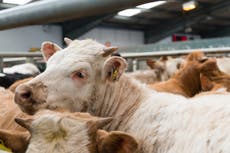Bring up your kids in the countryside if you dare
After a recent poll found a preference for raising children in rural areas, Will Gore experiments in a Welsh wood


Social media has been abuzz this week. I mean, that’s hardly unusual I suppose, but it has felt particularly so in recent days. We’ve had the reaction to Emily Maitlis’s comments on the BBC; a woman went viral for confronting the health secretary, Steve Barclay, outside a London hospital; and Liz Truss’s hint that Emmanuel Macron might be foe rather than friend caused further uproar.
But amid spiky debates about the energy crisis, the Tory party leadership, striking barristers and the rest, one question seemed to especially inflame passions: is it better to raise kids in an urban environment or in the country?
A YouGov poll had asked where, in general, do you think children would have a better upbringing: 6 per cent of respondents plumped for the city, 26 per cent said town, and a whopping 44 per cent argued for the countryside – despite 82 per cent of the UK population living in urban areas. Oddly, the remaining 24 per cent didn’t know what to think.
Twitter was aghast at the results. “Countryside is boring!” came the cry. Many suggested that anyone who’d answered “country” had never lived there as children: “I grew up in the countryside,” said one user, “and it was shit.” “Crazy”, was all one man could say, their avatar’s head shaking sadly; another suggested that the poll results were due to “bigoted boomers” hating cultural diversity, which seemed a bit of a leap.
A valiant few tried to point out that pastoral life can be jolly pleasant, but they were an overwhelmed minority. Perhaps people in sleepy villages were struggling with their wifi to get involved, or were too busy playing sad games of pooh sticks with their fed-up children.
As coincidence would have it, I spent most of the last week staying with my brother in rural Wales. A year ago, he and his wife traded in their three-bedroomed semi-detached house in a Cambridgeshire town for a farmhouse and 40-odd acres of woodland on the edge of a tiny village some 20 miles from Aberystwyth. They have not once looked back.
Really though, childhood has periods of boredom wherever you are; it also has its privations, real or imagined, and its anxieties
Our visit on this occasion had a slightly selfish bent. My wife and I were both working, and didn’t particularly want to spend hundreds of pounds on summer camps or other childcare options. The prospect of working from home, in our own modest semi, with its impractical garden, while trying to keep the kids occupied felt unrealistic – and indeed, the WFH option was not open to my wife anyway.
At my brother’s place, with three adults on hand, chickens to feed, nature and exploration available in abundance, keeping everyone happy seemed possible. And sure enough, the kids have found great enjoyment in checking for eggs in the morning, playing in the pasture behind the house and picking blackberries in the woods. If we lived in such a place ourselves, I’ve no doubt they would have a lovely upbringing.
But it’s also true to say that they have had moments of boredom. And they’ve also missed the comforts of a daily bath, since my brother isn’t attached to the mains and the drought has meant the water in the well is running low.
Really though, childhood has periods of boredom wherever you are; it also has its privations, real or imagined, and its anxieties. And for the overwhelming majority, there are times of great fun, love, and joy too. Money can make things easier, and often does, whether in an urban setting or the country – but it’s not the be-all and end-all (current cost of living crisis notwithstanding). I don’t think my own children would be either better or worse off in their general wellbeing if we lived in isolated splendour or in a big city, rather than the leafy town which is our home at present.
Of course, the people questioned by YouGov were adults, who have a tendency both to project their own views on to ideas about their children, and to think a change of scene can cure all ills. Had children (not moody teenagers) been asked, it’s easy to imagine a very different outcome. After all, most children don’t spend much time thinking about alternative existences (aside from ones in which they are living with dinosaurs or in castles): their lot is their lot, good and bad, and they wouldn’t much change it.
None of which should be taken to suggest that grown-ups (or kids for that matter) should not aspire to “better” lives, whatever that might mean for them. But it’s useful to remember that the grass isn’t always greener on the other side – or indeed in the countryside.
Join our commenting forum
Join thought-provoking conversations, follow other Independent readers and see their replies
Comments



Bookmark popover
Removed from bookmarks